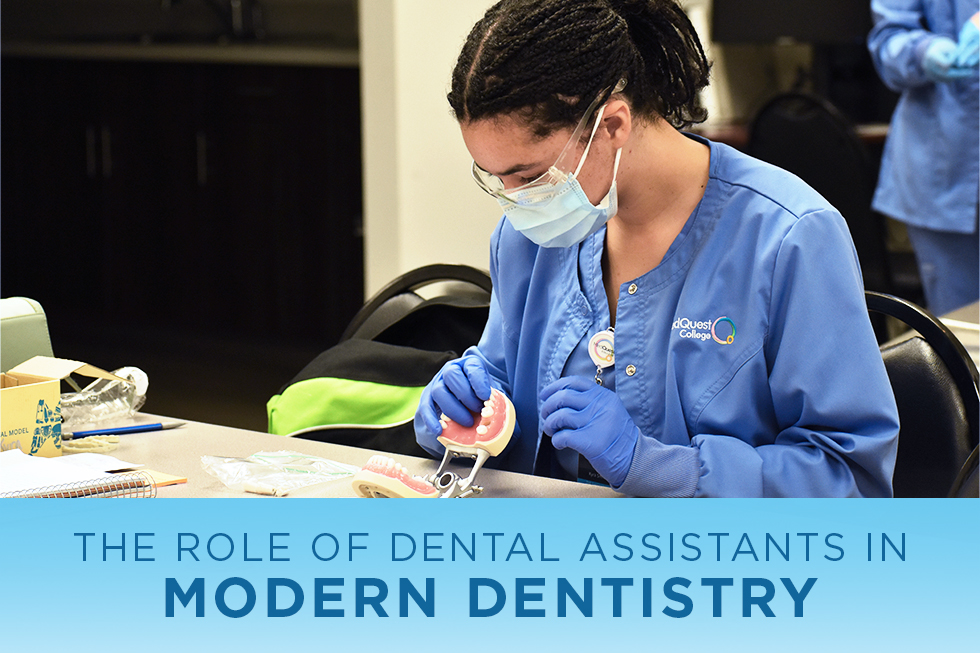In today’s rapidly evolving dental landscape, the role of dental assistants has grown. No longer confined to traditional tasks, dental assistants are taking on expanded responsibilities that make them essential members of dental teams. In this article, we’ll delve into the role of Dental Assistants in modern dentistry, exploring how their role has evolved, the skills now in demand, and the career paths that await.
The Evolution of the Dental Assistant Role
Initially, dental assistants primarily focused on basic support tasks—preparing instruments, handing tools to the dentist, and ensuring patient comfort. However, as dental practices adapt to technological advancements and new patient care standards, the responsibilities of dental assistants have grown. Modern dental assistants may now be responsible for taking X-rays, managing dental office software, educating patients on oral hygiene, and even assisting with specialized procedures.
Dental Assistants in modern dentistry are integral to patient care and the seamless operation of a dental practice. By supporting both clinical and administrative functions, they ensure dentists can provide efficient, high-quality care.
Key Responsibilities in Modern Dentistry
Let’s look at some of the key responsibilities dental assistants are taking on beyond their traditional roles:
– Patient Education: Dental assistants are now actively involved in educating patients about oral hygiene, explaining procedures, and guiding post-treatment care. By spending time with patients before and after treatments, they can make a lasting impact on patients’ long-term oral health.
– Technical Expertise with Dental Equipment: As technology advances, dental assistants must be proficient in using a range of equipment, such as intraoral cameras and digital X-rays.
– Infection Control and Safety Protocols: With heightened awareness around infection control, dental assistants play a crucial role in sterilization and ensuring that practices meet OSHA and CDC guidelines.
– Record-Keeping and Documentation: Dental assistants are now frequently responsible for entering patient information, updating dental records, and ensuring accuracy in charting.
Why Soft Skills Matter More Than Ever
Dental Assistants also see the importance of soft skills. Today’s dental assistants need more than technical expertise. They need interpersonal skills, empathy, and patience, as these qualities are essential when working with diverse patients who may experience anxiety or discomfort.
Communication Skills
Clear communication is fundamental. Whether explaining a procedure or addressing a patient’s concerns, dental assistants play a critical role in ensuring patients feel informed and comfortable.
Adaptability and Problem Solving
As dental procedures evolve, dental assistants must be able to adapt to new tools, techniques, and methods. Their role requires flexibility and the ability to think on their feet, especially in high-pressure situations.
Educational Requirements and Career Development
The scope of responsibilities for Dental Assistants requires formal training and certification. Aspiring dental assistants can pursue diploma or associate degree programs, with many programs including hands-on training and externship opportunities. Certification can be obtained through organizations like the Dental Assisting National Board (DANB) ® or American Medical Technologist (AMT)®.
Career Development Paths
For dental assistants, a clear career path can lead to roles such as:
– Expanded Duties Dental Assistant (EDDA): EDDAs perform more advanced tasks, including placing fillings and applying sealants.
– Dental Office Manager: With a strong understanding of both clinical and administrative duties, some dental assistants transition into office management.
– Dental Hygienist: Many dental assistants choose to further their education to become licensed dental hygienists, focusing on preventive dental care.
– Specialization Areas: Dental assistants can specialize in areas like orthodontics, oral surgery, and pediatric dentistry, where they can work directly with specialists.
The Impact of Technology on Dental Assisting
Dental Assistants see that technology is a driving force behind the evolution of dental assisting. Here are some of the high-tech tools and software that are transforming the field:
– Digital X-rays and 3D Imaging: Dental assistants trained in digital radiography can capture detailed images quickly, allowing for accurate diagnostics.
– CAD/CAM Systems: For practices that use CAD/CAM (computer-aided design and computer-aided manufacturing), dental assistants may assist in the creation of crowns and other dental restorations.
– Electronic Health Records (EHR): Today’s dental assistants must be proficient in EHR software, maintaining accurate patient records and managing billing processes.
How Dental Assistants Contribute to Patient-Centered Care
Dental assistant’s contribution to patient-centered care. Dental assistants are often the first and last points of contact for patients. Their efforts to build rapport and ensure comfort can significantly enhance patient experiences.
The Importance of Empathy
Dental procedures can be intimidating, but dental assistants have a unique opportunity to reassure patients and help them feel at ease.
Post-Operative Care
After a procedure, dental assistants play an essential role in providing patients with post-operative care instructions, ensuring they know how to care for their teeth and gums following treatments.
Challenges Facing Dental Assistants
Despite their growing responsibilities, dental assistants face challenges in terms of physical demands, managing patient anxiety, and balancing administrative and clinical tasks. Recognizing and addressing these challenges can help ensure that dental assistants feel valued and supported in their roles.
Managing High Patient Volume
Many dental practices serve numerous patients each day. Dental assistants must stay organized, manage their time well, and work efficiently to keep up with the pace.
Staying Up-to-Date with Best Practices
As dental technology and treatment methods advance, dental assistants need to stay current with new tools and techniques through continuing education and professional development.
Embracing a Dynamic Role in Modern Dentistry
Dental Assistants in modern dentistry reveal the depth and breadth of opportunities available to those in this career. Today’s dental assistants are more than just support staff; they’re educators, patient advocates, and skilled technical professionals. For those considering a career in dental assisting contact MedQuest College for information on their program.

